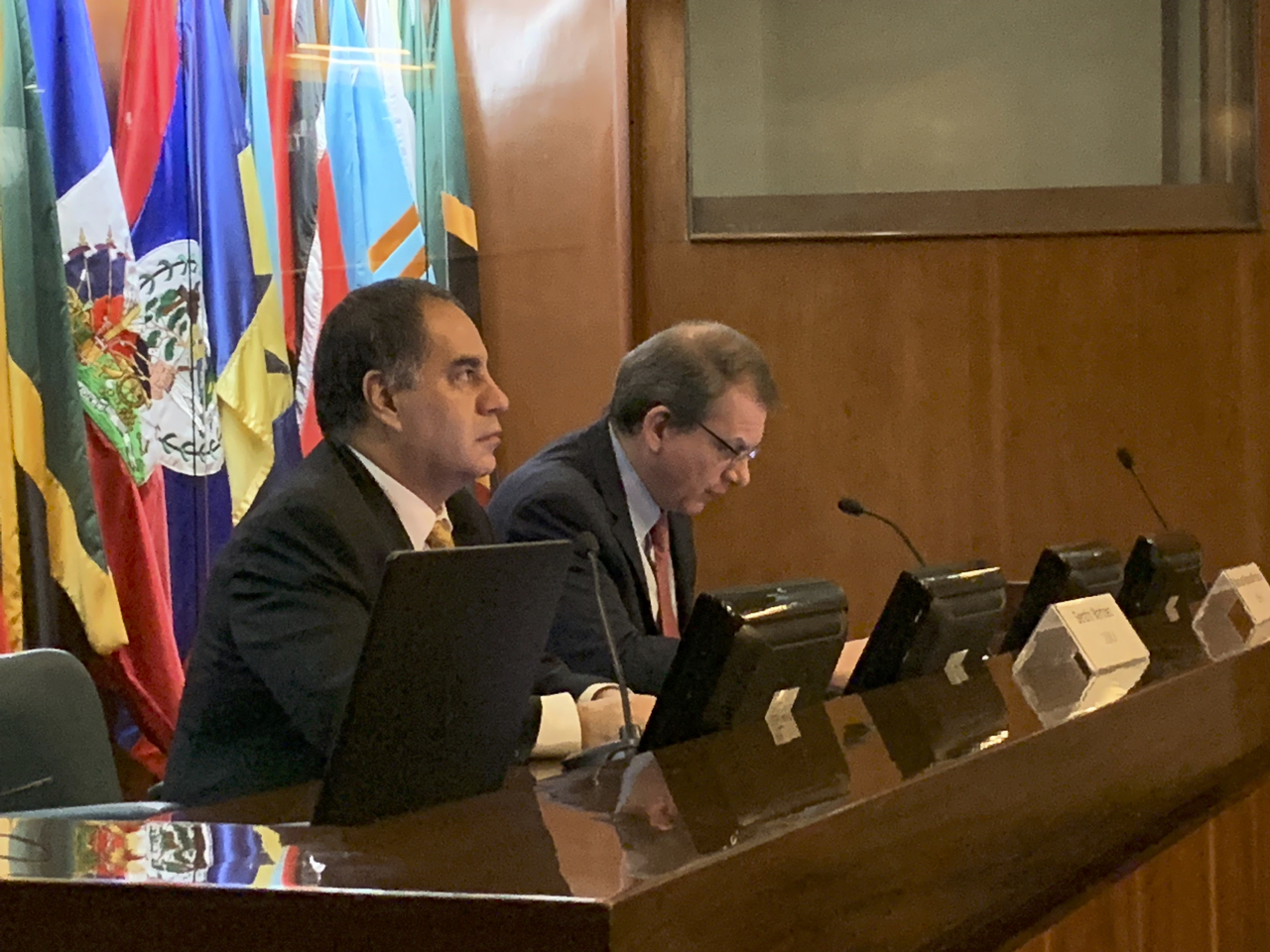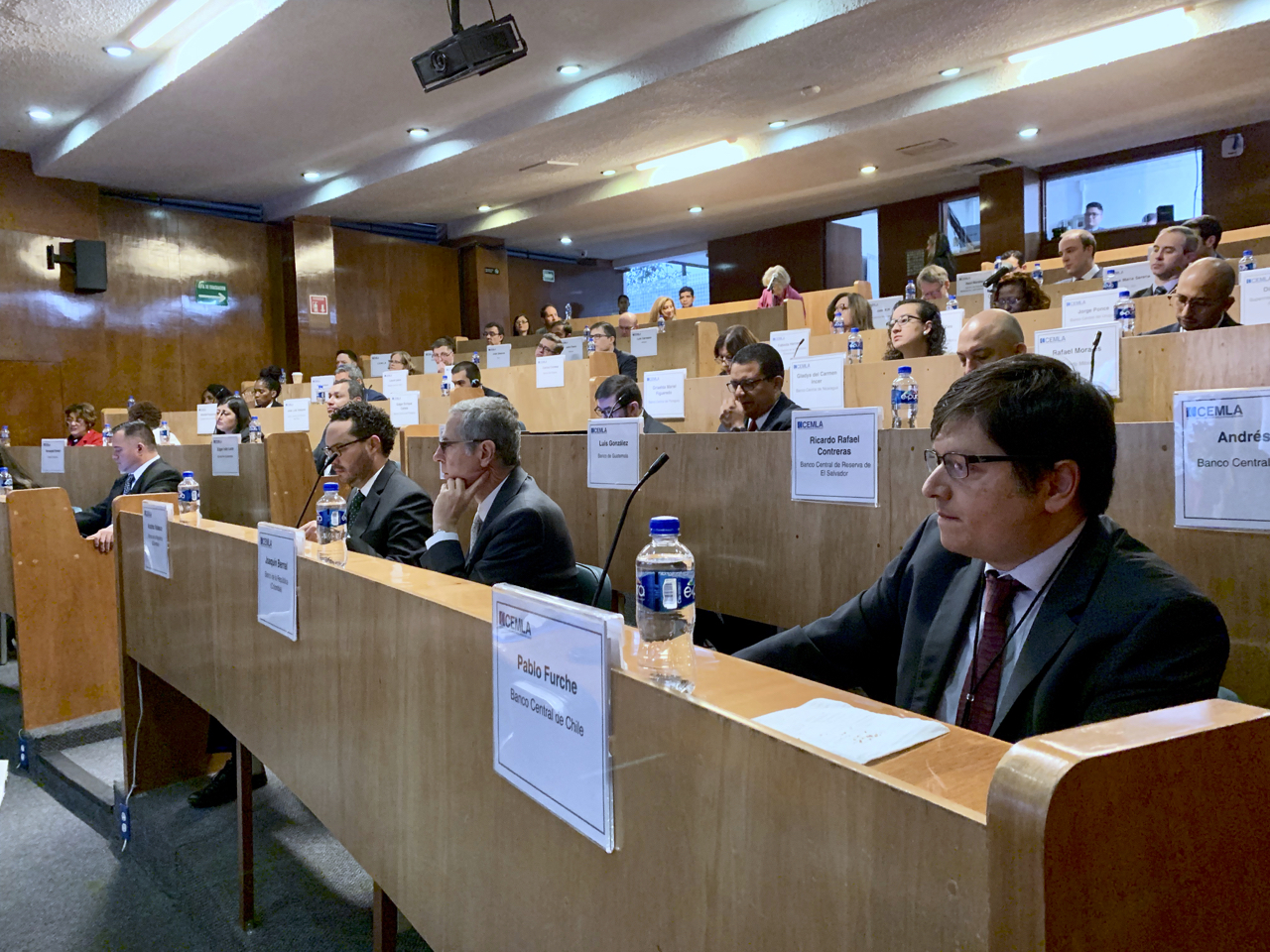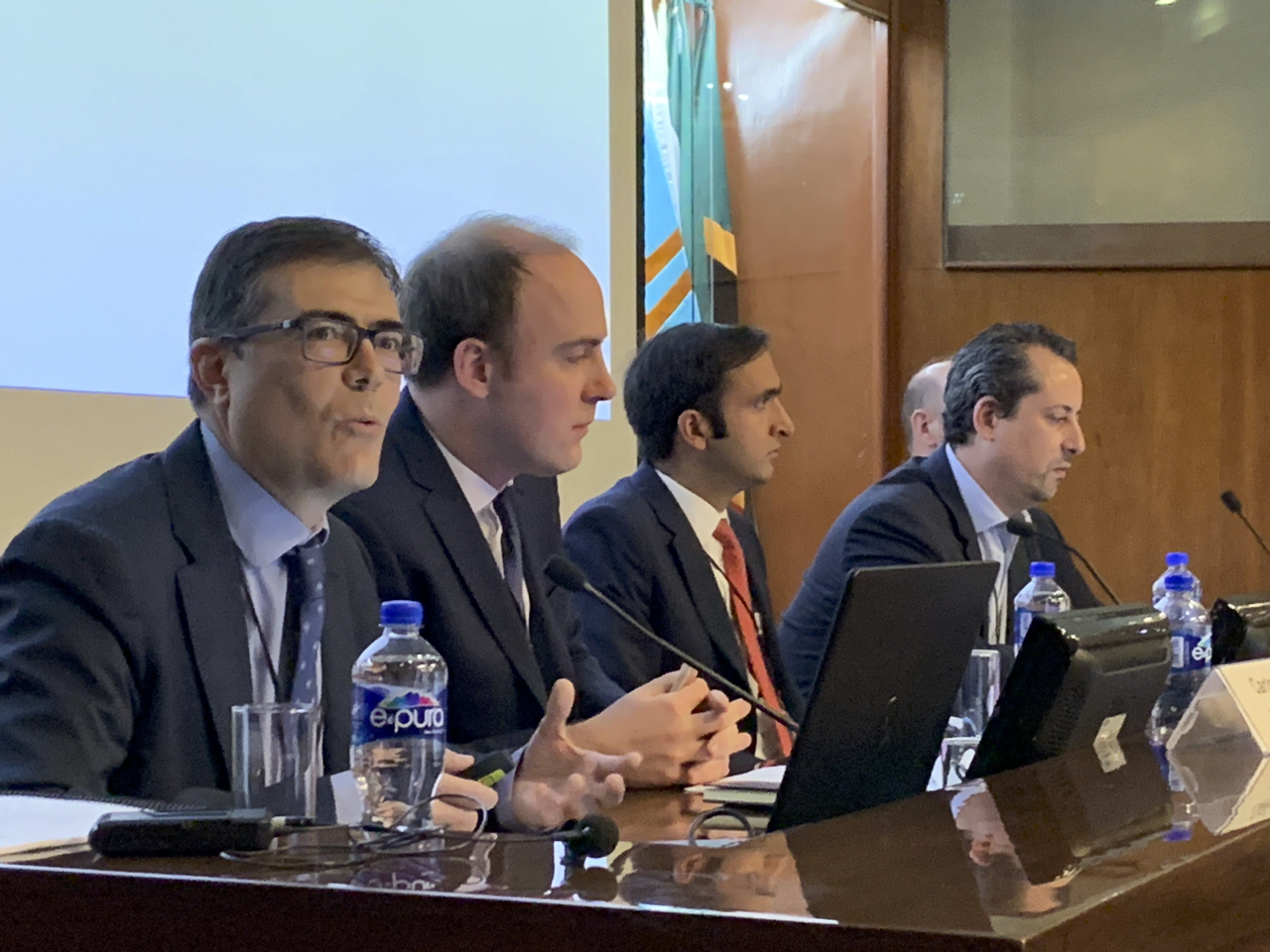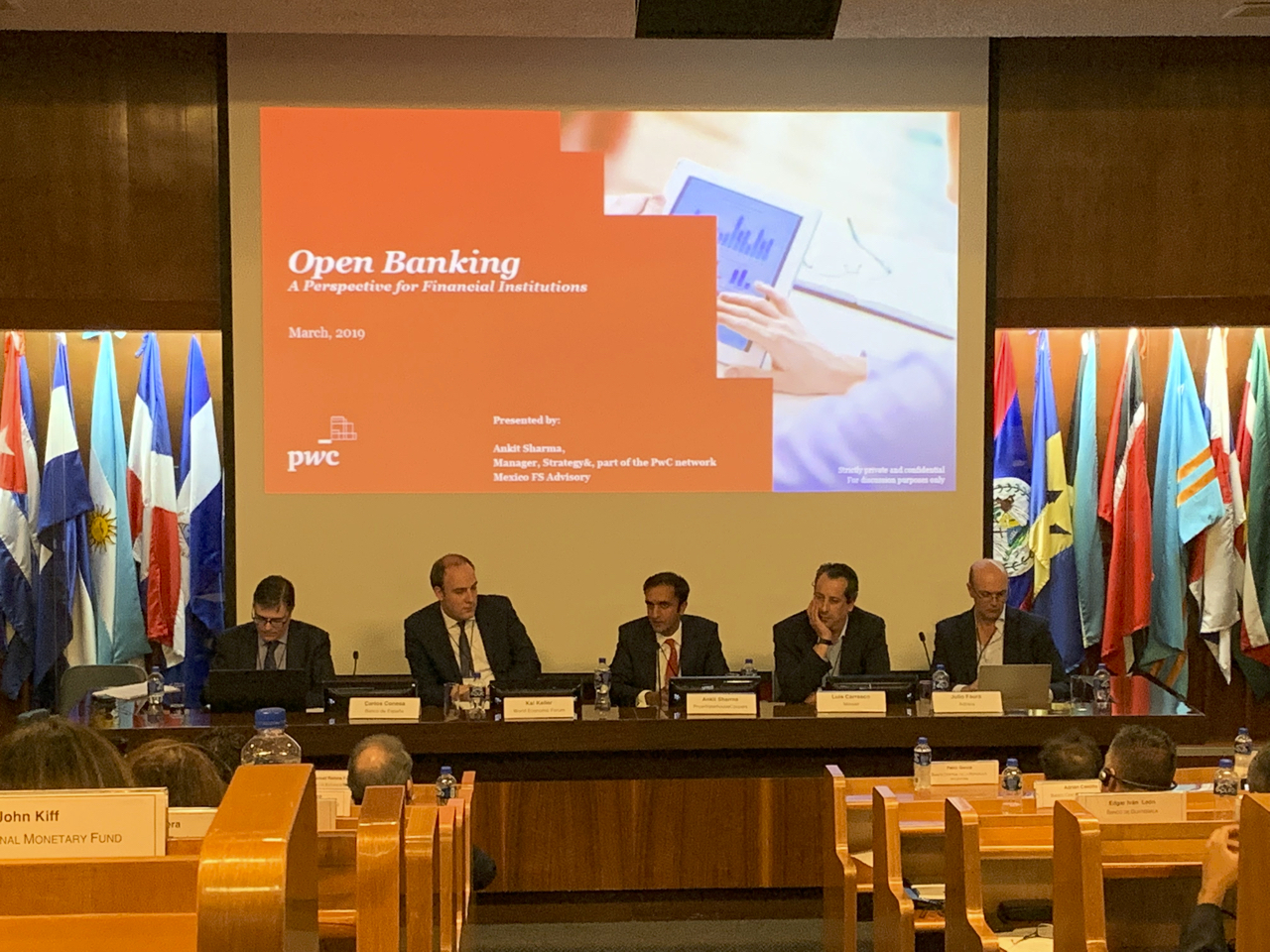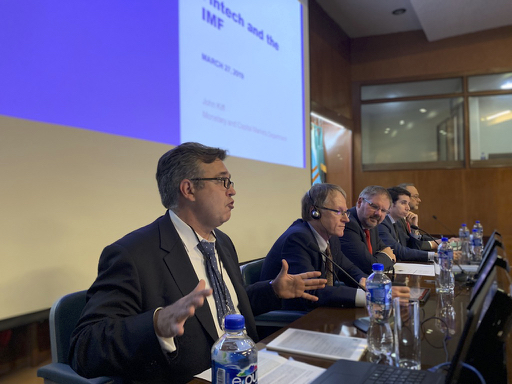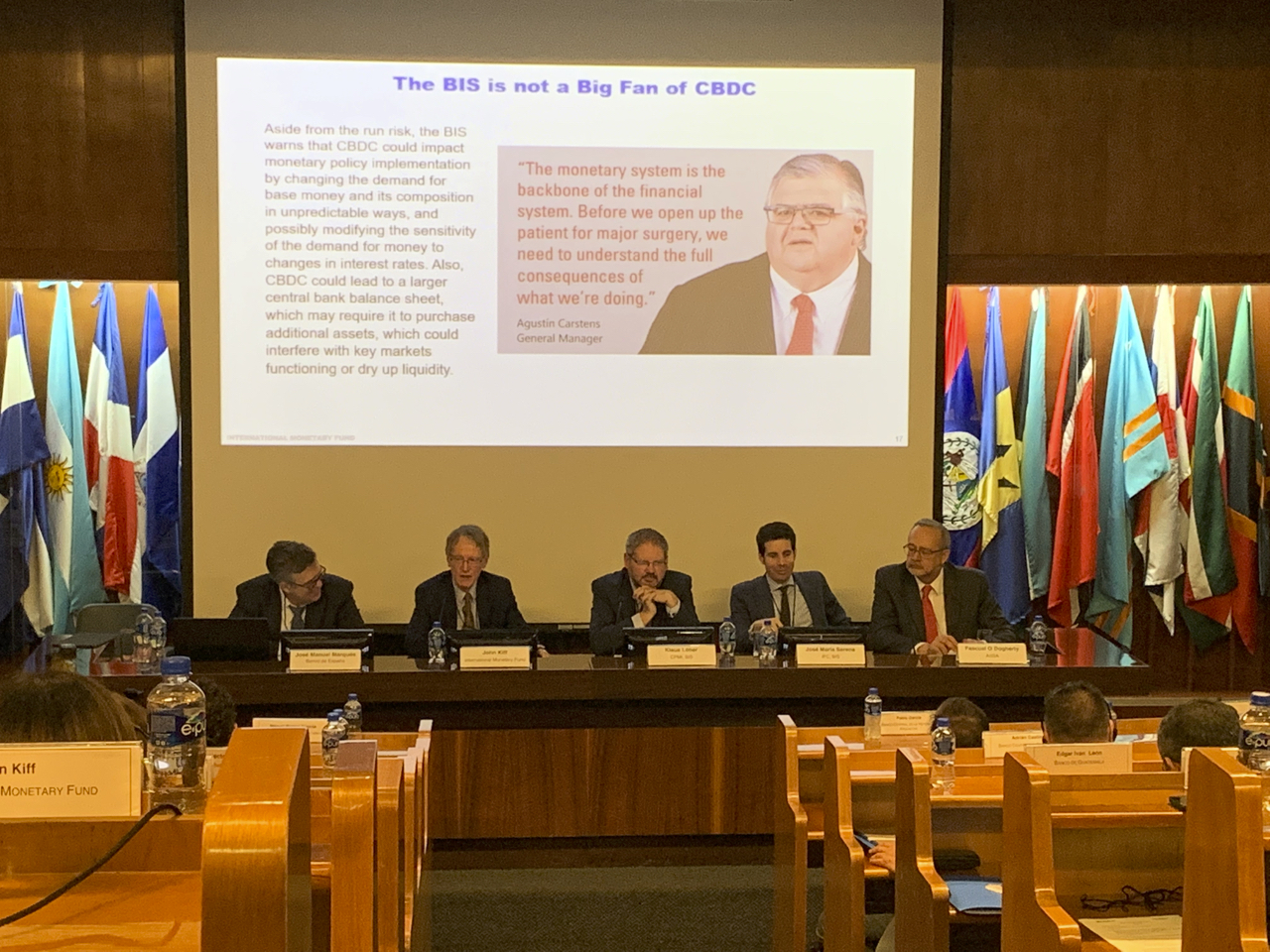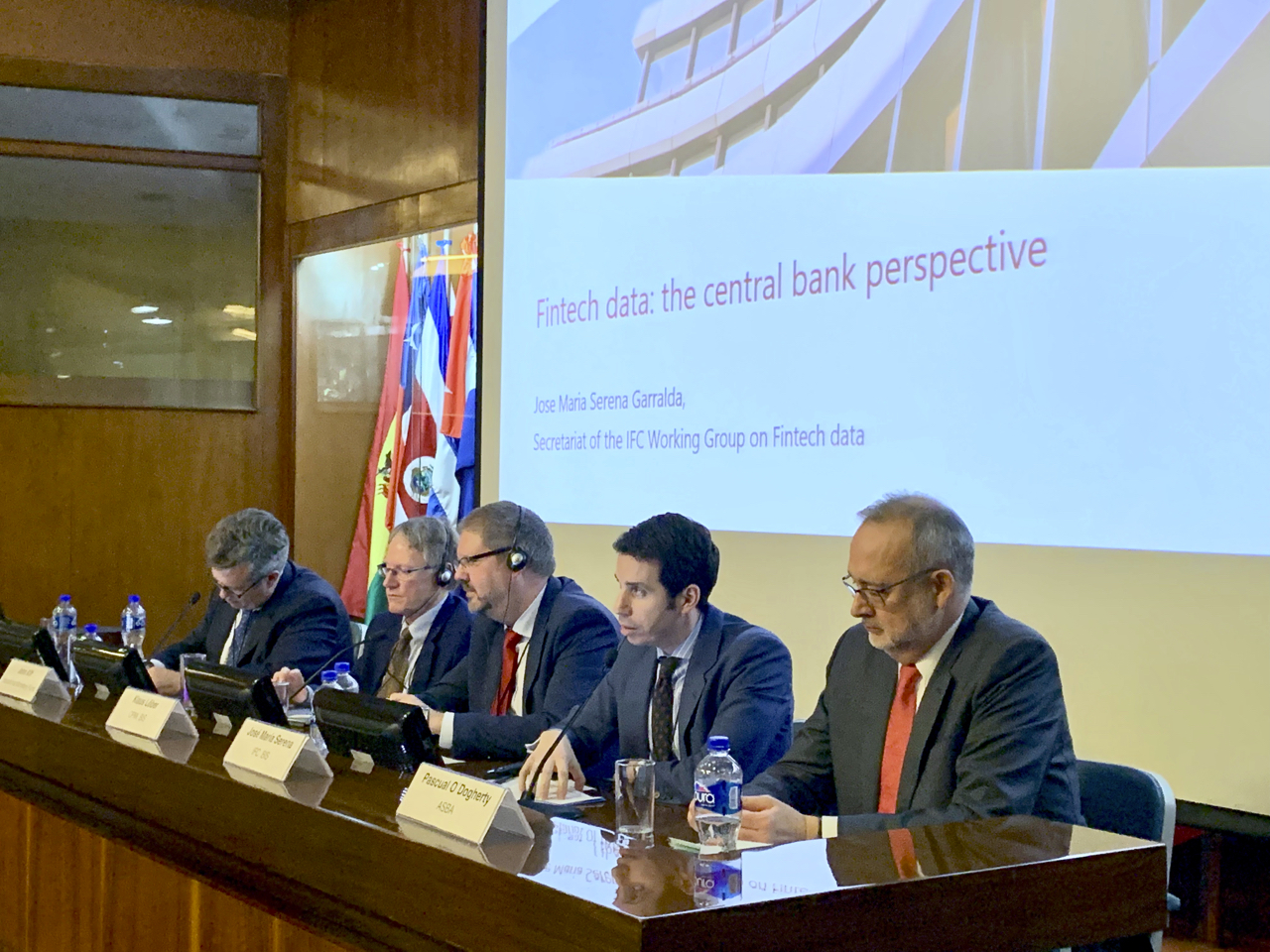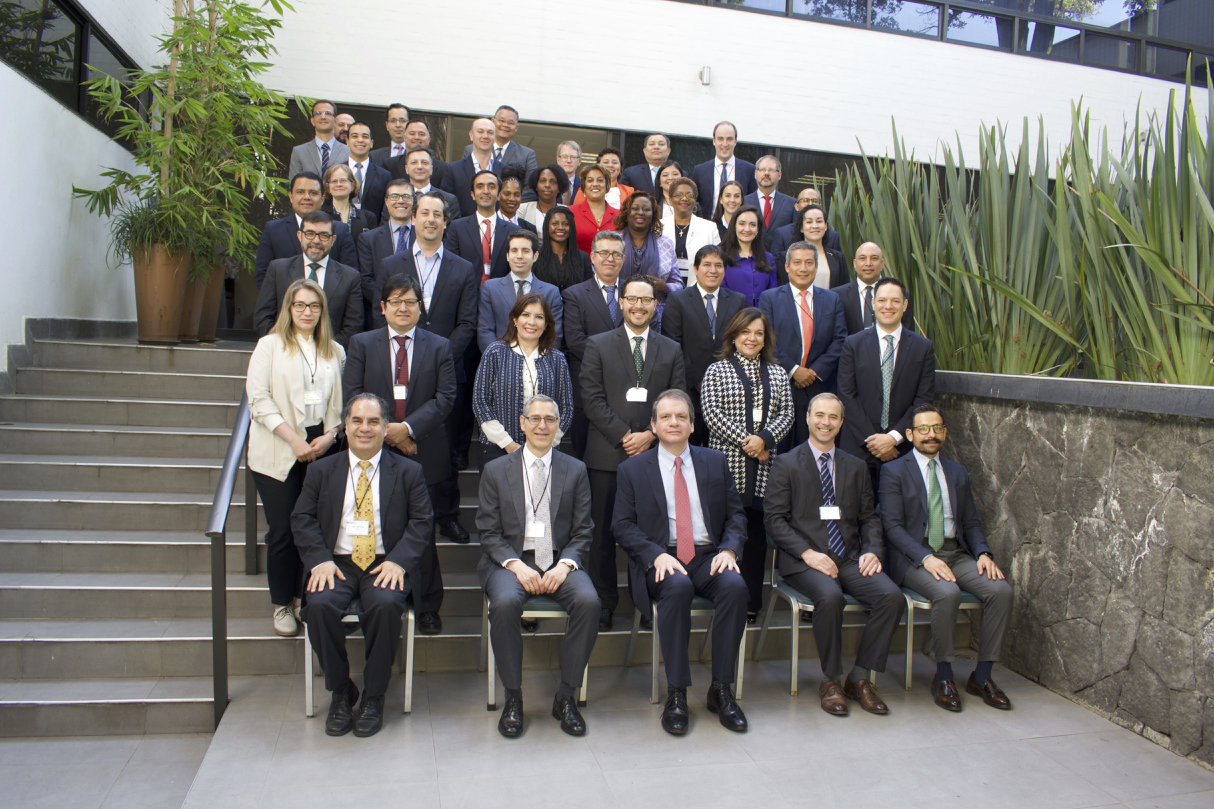II Meeting of the Fintech Forum
Mexico City, Mexico, March 27-29, 2019
CEMLA
Introduction
The II edition of the CEMLA Fintech Forum was hosted in Mexico City, from March 27 to 29, 2019. It was attended by 49 representatives of 35 institutions, including central banks, bank supervisory authorities, international organizations and the industry.
The Meeting had two main objectives. First, to discuss and share the regional experiences on fintech developments and to examine possible approaches for regulate them, as well as update of the related international agenda. Second, to present, to the plenary, the reports of the Working Group on Fintech Regulatory Aspects and of the Working Group on Central Bank Digital Currencies aiming to reach a consensus regarding their main conclusions.
Meeting’s sessions
Session 1 Fintech developments: the way forward for the financial industry
Chaired by Carlos Conesa, Deputy General Manager, Banco de España
The session was focused on four technologies that, among others, have been changing the financial landscape: artificial intelligence (AI), open banking, digital banking and blockchain. With new actors and market segmentation, the fintech developments are focusing in certain parts of the value chain and thereby changing financial services.
AI is enabling financial institutions to deliver new kinds of value and to improve efficiency. AI is altering the attributes to build a successful financial services business, with a possibility to shift the current market structure to a possible point where the competitors will divide into big or niche players. Additional, is it possible that the AI brings a new set of competitive factors: a) customization, b) capturing attention, and c) develop ecosystems, leaving behind the traditional players differentiations: price, speed and access.
Open banking has multiple implications to the financial ecosystems with the possibility of develop new business models, by focusing in one part of the chain value namely a) customer experience, b) infrastructures or c) products/services; and under a collaborating model in which data is shared. In that sense, as with AI, the regulation of opening banking and applications programming interfaces (APIs) has a mayor role in the fintech development. Currently, there are different regulation approaches in this matter, but it can be said that payments and accounts are the central core of these approaches.
Regarding digital banking, the innovations are mainly focused on the customer experience, with data as an input. These types of the business models are based on modular platforms with functional scope and promoting the concept of a flexible and reliable bank.
In one way or and other, each of the exposed technologies place data as the center or as a key input of their business models, and with that of the evolution of the financial industry itself.
Panel: Risks and challenges for the fintech industry
Session chaired by Serafín Martinez Jaramillo, Advisor, CEMLA
The panel addressed, in the opinion of the industry representatives, barriers to tackle, main risks, challenges and regulations issues in the fintech industry with questions such as: Are fintech companies ready to adopt voluntarily testable and enforceable risk management frameworks? What would be a minimum set of reliable and timely data about fintech developments to properly monitor emerging system wide risks? And, Is the current regulatory framework adequate to promote this industry taking into consideration the possible emerging risks?
Cybersecurity, the risk of inadequate regulatory frameworks, and an unleveraged playing field can be frame as the key current concerns. Regarding cybersecurity, it was classified as a possible entry barrier to new players given the costs to cover. Concerning regulations, it was highlighted that companies may be leave out of an adequate regulatory framework, given their business nature or the evolution of their business (e.g. loan companies investing their capital). In the opinion of an industry representative “Fintech companies are eager to have a regulatory framework, aiming to demonstrated that their model is sustainable.”
Session 2: The international fintech agenda and its implications for Latin America and the Caribbean
Session chaired by Jose Manuel Marques, Head of the Financial Innovation Division, Banco de España
The session addressed international organisms’ current efforts regarding fintech issues. The topics exposed were a) the IMF-World Bank Bali Fintech Agenda, b) the Committee on Payments and Market Infrastructures (CPMI) work agenda, c) the Irving Fisher Committee on Central Bank Statistics (IFC) efforts on fintech’s data and statistics, and d) the ASBA’s regional overview on fintech developments.
The Bali Fintech Agenda it was resumed on 12 elements that are grouped on 4 basic objectives: a) foster enabling environment to harness opportunities, b) strengthen financial sector policy framework, c) address potential risks and improve resilience, d) promote international collaboration. Setting objectives as broad as they are portrayed in the Bali Agenda may be a base for national financial authorities or central banks to embark on fintech.
In the case of the CPMI’s work, the efforts are focused on digital innovations such as private digital tokens for wholesale settlements and legal aspects of digital currencies. Likewise, in partnership with IOSCO other related topics are currently been analyzed: role of bigtechs, tokenization of securities, integration of trading, and clearing and settlement platforms.
The importance of data was again highlighted the by IFC work agenda. To monitoring fintech it is necessary new datasets, statistical definitions and even adjustments on current statistical frameworks (e.g. national accounts). With this background the IFC Working Group on Fintech Data was established; its agenda covers a review of the existing data sources, an assessment of the central banks’ additional needs for fintech data and the identification of key data gaps. The report is expected to be release by January 2020.
To end the session, a LAC fintech panorama was presented by ASBA. A regional stocktaking allowed to identify that the current regional regulatory approaches are “wait and see”, test and learn, fintech license, regulatory sandbox, parallel regulations and prohibitions. Regarding the regional challenges this can be grouped in a) regulation issues, b) information issues, c) regtech/techfin, and d) coordination among authorities. Finally, in the opinion if the respondents fintech may implies risks for the systemic stability, the individual financial stability, the liquidity, the integrity (AML/CFT), the financial inclusion the market conduct, among others.
Session 3: Central banks’ efforts to deep dive in new financial technologies
Session chaired by Raúl Morales Reséndiz, Manager of Infrastructures and Financial Markets, CEMLA
Fintech under the central banks’ perspective was the main premise of this session. The speakers briefed on the actions and organizational strategies of their central banks on fintech matters.
The Federal Reserve System representative explained that, at this time, their strategy is to focus in three main areas: a) research (on new technologies and their potential), b) regulation with other agencies (if or how fintech should be regulated) and c) monitoring (track developments). In that context, the research efforts include topics such as Central Bank Digital Currencies (CBDC), private digital currencies, and macro and consumer impacts of fintech. Regarding regulation, the current approach is by type of activity, not size. Concerning the monitoring task, regular contact with different national agencies and international organizations it has been a constant. To concluded it was highlighted that the central bank organization do not have changes to address fintech-related issues.
The Banco de España had created a financial innovation division to pursue a better understanding of the nature, scale and potential impact of tech-based innovations. This division has among its duties to strengthened monitoring and analytical capabilities with a horizontal focus and to fulfill an advisory role to the Central Bank’s Board on innovation-related policy developments. Beside the changes in the Banco de España’s structural organization, two projects can be added to their efforts to address fintech: a) an internal proof-of-concept exercise using the distributed ledger technology and b) the Spanish Sandbox project (at the present a draft law).The Magyar Nemzeti Bank (MNB, Central Bank of Hungary) aims to support digital innovation through two main initiatives: the MNB innovation hub (Fintech Lab) and the MNB regulatory sandbox. The MNB innovation hub was established in March 2018, works as a hub between the central bank and the market players and this aim is to find the secure way to implement fintech innovations in the market. The MNB regulatory sandbox (December 2018) is a customized test environment in which fintech innovations can be tested for a certain time, under predefined conditions, on a limited number of customers and with the exemption from certain regulatory requirements.
The representative of Bank of Canada presented institution’s work regarding fintech and digital currencies: research, experiments and collaboration on regulatory matters. At this time, in terms of CBDC issuance the research is oriented to specify what are the trade-offs for the financial and the payment systems, the monetary policy and the cyber risk. As for experiments, the Bank of Canada has and continue experimented with DLT for its large value payment system. Since the Bank of Canada is not a banking or securities regulator, its role is a more as a collaboration entity, so far.
Session 4: Discussion - Working Group on Central Bank Digital Currencies
Session facilitated by Joaquin Bernal (as Group Coordinator), Banco de la República
The session was devoted to present the report of the Working Group on Central Bank Digital Currencies (CBDC WG), to inform the main findings, and to reach a plenary consensus on the report’s content and conclusions. To start the session, CBDC aspects such as implementation issues, design implications, regulatory and legal framework, citizen´s digital preparedness, efficiency and competition in the payments market, operational capacity and challenges, among others where addressed in an open discussion. Apropos the report consensus, the plenary was asked about the main report’s statements, each one was presented, and discussed before being endorsed or requested to be modified. The final version of the report will be prepared with all the comments made in this session, and published in the second quarter of 2019.
Session 5: Discussion - Working Group on Regulatory Fintech Aspects
Session facilitated by Jorge Ponce (as Group Coordinator), Banco Central del Uruguay
Under the same premises of the previous session, this focused on the report of the Working Group on Regulatory Fintech Aspects (REG WG). The first part of the session was dedicated to discuss the main document’s statements, regarding functional approach, proportionality, technological flexibility, level playing field competition, cybersecurity, data protection, intergovernmental and international coordination, among others. A consensus has reached and the final version of the report will be prepared and published in the second quarter of 2019.
Round table on fintech initiatives and novelties from Latin America and the Caribbean authorities
Session facilitated by Raúl Morales Reséndiz, Manager of Infrastructures and Financial Markets, CEMLA
The 20 Latin-American and the Caribbean delegations attending the meeting presented a brief resume on their jurisdiction's fintech approach.In most cases fintech companies’ presence is limited, however, in general it is recognized that they are expanding companies. It can be concluded that payments, financial services and remittances are the areas with the greatest fintech participation. Regarding the new players, Telcos and BigTechs are having an important role in the way fintech is developing in Latin American and in the Caribbean.
From the perspective of the regional central banks fintech is cataloged as a multi-disciplinary phenomenon; and so far, its implications and challenges are being monitored and analyzed mainly by multidisciplinary groups (that general includes staff of legal, payments, financial stability, research and IT departments). Additionally, is confirmed that regional central banks are having communication with relevant authorities to determine implications and challenges they face concerning: financial stability, financial inclusion, consumer protection, among others.
Session 6: Discussion of the Fintech Forum 2019 – 2020 agenda
Session facilitated by Serafín Martínez Jaramillo, Advisor, CEMLA
This session was aimed to address the fintech-related issues or areas of interest of the Forum’s membership for and how those can be addressed in the Fintech Forum’s agenda 2019 – 2020. Six topics where identified: a) Data needs, b) Regional repository, c) CBDC regional experimentation, d) Regulatory regional approach, e) BigTechs and, f) Digital finance and financial education.
The Secretariat will make work proposals for each of the topics and will consult the membership, in a timely manner, the adequately manner to address them.
Opening remarks by Dr. Manuel Ramos-Francia, Director General, CEMLA ![]()
Fintech developments: the way forward for the financial industry
Session chaired by Carlos Conesa, Deputy General Manager, Banco de España
Kai Keller, Project Lead/GLF, World Economic Forum
Panel: Risks and challenges for the fintech industry
Session chaired by Serafín Martinez Jaramillo, Advisor, CEMLA
Kai Keller, Project Lead/GLF, World Economic Forum
Ankit Sharma, Manager, PWC
Luis Carrasco Torres, Director of Market Solutions, Minsait
Julio Faura, CEO, Adhara
The international fintech agenda and its implications for Latin America and the Caribbean
Session chaired by Jose Manuel Marques, Head of the Financial Innovation Division, Banco de España
Klaus Löber, Head of Oversight Division, ECB, representing the CPMI, BIS
John Kiff, Monetary and Capital Markets Department, International Monetary Fund
Pascual O'Dogherty, Executive Secretary, ASBA
Central banks' efforts to deep dive in new financial technologies
Session chaired by Raúl Morales Reséndiz, Manager of Infrastructures and Financial Markets, CEMLA
Ruth Judson, Senior Economic Project Manager, Board of Governors of the Federal Reserve System
Carlos Conesa, Deputy General Manager, Banco de España
László Ipacs, Head of the Fintech Lab Division, Magyar Nemzeti Bank
Francisco Rivadeneyra, Senior Research Advisor, Bank of Canada
Discussion - Working Group on Central Bank Digital Currencies
Session facilitated by Joaquin Bernal (as Group Coordinator), Banco de la República
Discussion - Working Group on Regulatory Fintech Aspects
Session facilitated by Jorge Ponce (as Group Coordinator), Banco Central del Uruguay
Round table on fintech initiatives and novelties from Latin America and the Caribbean authorities
Session facilitated by Raúl Morales Reséndiz, Manager of Infrastructures and Financial Markets, CEMLA
Discussion of the Fintech Forum 2019 – 2020 agenda
Session facilitated by Serafín Martínez Jaramillo, Advisor, CEMLA
Closing remarks by Dr. Manuel Ramos-Francia, Director General, CEMLA ![]()
On October, 2017, CEMLA presented the initiative to establish the Fintech Forum, to its Board of Governors and Assembly of Central Banks' Governors of Latin America and the Caribbean. This regional initiative aims at promoting the exchange of knowledge and experience of central banks, international organizations and other relevant institutions, in order to analyze the dimensions and implications of the fintech phenomenon in central banking mandates. The Forum is envisaged to address strategic challenges that financial innovation entails for monetary and financial stability, and for the proper functioning of central banks of Latin America and the Caribbean.
The mandate of the Forum is to disseminate and share best practices, experiences and knowledge of experts from different areas of specialization within the region's central bank community, in order to contribute to a better understanding of the interaction of new financial technologies with monetary and financial stability, with emphasis in the design, functioning, regulation and surveillance of said technologies.
Kai Keller, Project Lead/GLF, World Economic Forum
Kai Keller leads the World Economic Forum's work at the intersection of innovation and financial stability where he is also a Global Leadership Fellow. He is working with private, public and civil society stakeholders exploring the transformation of the financial ecosystem resulting from technology-enabled innovation. Kai holds a B.A. in Politics and Economics from Brandeis University (Waltham, MA) and a M.A. in Law and Diplomacy from the Fletcher School at Tufts University (Medford, MA).
Ankit Sharma, Manager, PWC
Ankit is Financial Services Strategy Manager at PwC. He has over 8 years of experience collaborating with leading banks in Europe, the Middle East and now Mexico. Ankit focuses on projects related to corporate strategy, digital transformation, cost reduction and data analysis. Ankit also publishes regularly in major newspapers in Mexico on issues related to Fintech's policy and issues related to Open Banking. Ankit began his career in Investment Banking at the Royal Bank of Scotland and has a Master's degree in Management from the London School of Economics and a bachelor's degree from the Indian Institute of Technology.
Luis Carrasco Torres, Director of Market Solutions, Minsait
Luis is Global Director of Banking and Insurance Solutions at Minsait an Indra Company. His responsibilities include the development and implementation of business solutions to solve the technological and operational needs of banking and insurance companies, enabling their digital transformation and helping them to building a competitive offering in a constantly evolving environment. Masters in Business Administration and Management from the Carlos III University of Madrid, Luis has over 20 years of experience in the ideation of business solutions for the financial sector and in the development of technology products, working in companies such as PricewaterhouseCoopers, IBM, Temenos and, currently, Indra.
Julio Faura, CEO, Adhara
Julio has been driving innovation for more than 20 years of financial services experience and has held several corporate leadership roles there in Investment Banking, Consumer Finance, and IT & Operations. He led R&D in Blockchain at Santander and was the first chairman of the EEA, and is the chairman of Alastria, a board member of WSBA and co-founder of the USC. Julio holds a PhD in CS/EE, and a MSc from MIT.
Klaus Löber, Head of Oversight Division, ECB, representing the CPMI, BIS
Klaus Martin Löber is Head of the Oversight Division of the European Central Bank, in charge of the oversight of financial markets infrastructures and payments instruments and acts as chair of the ESCB working group on oversight. His areas or responsibility also encompass the ECB's global regulatory policy activities with a focus on payments and market infrastructures. Furthermore, Mr Löber is contributing to the ECB's fintech and digital innovations agenda and acts as chair of the CPMI working group on digital currencies and co-chair of the CPMI-IOSCO working group on digital innovations looking into relevant developments. Prior to his current position, from 2012 to 2016, Mr Löber was Head of the Secretariat of the Committee on Payments and Market Infrastructures (CPMI). In this capacity, he was a member of the Resolution Steering Group of the Financial Stability Board (FSB), a member of the FSB Standing Committee on Standards Implementation, secretary of the CPMI-IOSCO Steering Group and co-chair of the CPMI-World Bank Retail Payments Forum. Earlier positions include the European Central Bank, the European Commission, Deutsche Bundesbank and private practice. Mr Löber regularly publishes on financial markets legal, regulatory and infrastructure issues.
John Kiff, Monetary and Capital Markets Department, International Monetary Fund
John Kiff has been a Senior Financial Sector Expert at the International Monetary Fund (IMF) since 2005. Prior to that, he worked at the Bank of Canada for 25 years, where he spent most of his time managing the funding and investment of the government's foreign exchange reserves, including running its large interest rate and currency swap book. At the IMF he was part of the team that produces the semi-annual Global Financial Stability Report. More recently he has been focusing on fintech issues, over-the-counter derivatives, and pension risk transfer markets. He has published many articles and papers on these topics, and actively tweets on them on Twitter (@Kiffmeister).
Pascual O'Dogherty, Executive Secretary, ASBA
Pascual is an economist from ITAM with postgraduate studies at Northwestern University. He spent several years at Bank of Mexico holding managing positions in financial stability, banking operations and treasury, and was also appointed as Executive Secretary of the Mexican Financial Stability Board in 2013. From January this year, Pascual is the Secretary General for the Association of Supervisors of Banks of the Americas.
José María Serena, Economist, IFC, BIS
Jose Maria is an economist at the Bank for International Settlements. Previously he worked at Bank of Spain. He has an interest in various data issues, such as the measurement of fintech, data standardization, microeconomic data combination. He conducts research and analysis in international finance using microeconomic data.
Ruth Judson, Senior Economic Project Manager, Board of Governors of the Federal Reserve System
Ruth Judson is an economist at the Federal Reserve Board, where she has worked on a wide variety of topics including the international use of U.S. currency, monetary aggregates, open market operations, international capital flows, and, now, digital currencies and fintech. She holds a PhD from MIT.
Carlos Conesa, Deputy General Manager, Banco de España
Carlos Conesa joined Banco de España in 1998 and has developed his career in various positions at the central bank, working in issues related to market infrastructures policy and oversight. From 2013 and until 2015, he worked in the BIS as a member of the CPMI Secretariat. Upon his return to Banco de España, he was appointed Director of the Payment Systems Department. In February 2018, he was promoted to his current position of Associate Director General in charge of financial innovation and market infrastructure projects and services. He has been a member of several Committees and working.
- CEMLA:CEMLA: Fintech: key issues and challenges for central banks
- International Monetary Fund: Fintech and the IMF
- Basel Committee on Banking Supervision (BIS) Sound Practices: implications of fintech developments for banks and bank supervisors


